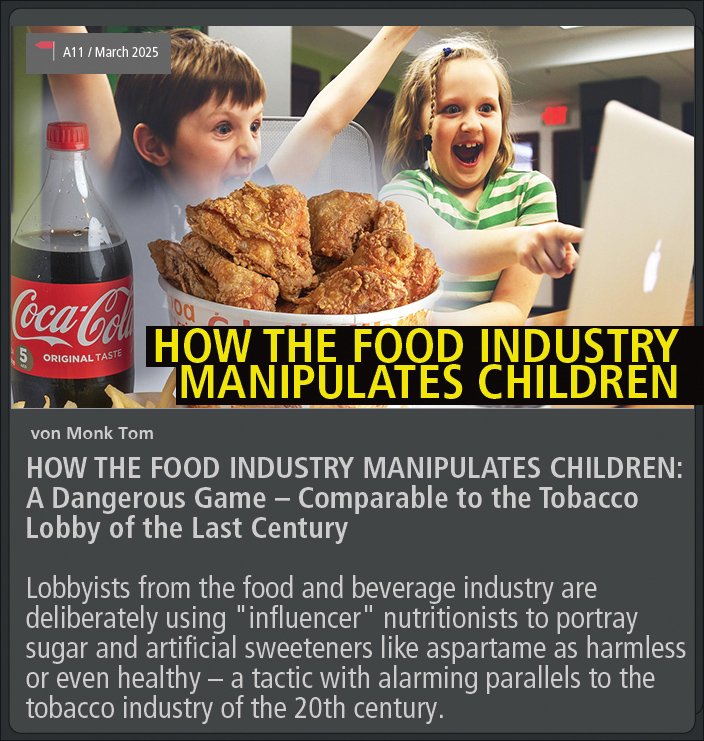HOW THE FOOD INDUSTRY MANIPULATES CHILDREN


By Monk Tom
A Dangerous Game – Comparable to the Tobacco Lobby of the Last Century
A silent war is raging on social media over the health of our children. Lobbyists from the food and beverage industry are deliberately using "influencer" nutritionists to portray sugar and artificial sweeteners like aspartame as harmless or even healthy – a tactic with alarming parallels to the tobacco industry of the 20th century. Back then, cigarette companies promoted smoking through massive product placement in movies and by bribing experts, despite knowing about the cancer risks.
Today, food corporations are employing the same strategy: They’re exploiting social media to manipulate younger generations and parents – with devastating consequences.
The New Tactic: Health “Experts” as an Arm of the Industry
As revealed by The Washington Post and The Defender , the American Beverage Association (ABA) , a lobbying group representing Coca-Cola, Pepsi, and others, pays registered dietitians and doctors to promote aspartame and sugar on social media as "safe" and "part of a balanced diet." These "influencers" – often with tens of thousands of followers – post videos and images encouraging kids and teens to snack on candy, ice cream, or diet drinks. Many fail to disclose their financial ties to the industry, violating Federal Trade Commission (FTC) guidelines.
The campaign aims to undermine warnings from the World Health Organization (WHO), which classifies aspartame as "possibly carcinogenic" and advises against its use for weight loss. At the same time, sugar consumption – a leading driver of obesity and diabetes – is legitimized through seemingly scientific arguments. "The industry exploits the credibility of nutritionists to disguise commercial messages as professional health advice," criticizes Dr. Michelle Perro, a pediatrician and environmental medicine expert.
Big Tobacco 2.0: From Hollywood to TikTok
The methods of the food lobby eerily resemble those of the tobacco industry. In the 1950s to 1990s, cigarette companies placed their products in Hollywood films, sponsored sporting events, and funded "scientific studies" downplaying the dangers of smoking. Stars like Humphrey Bogart and Audrey Hepburn became unpaid promoters while the industry specifically targeted youth. Today, it’s no longer movie stars but social media influencers taking on that role.
The difference? The reach is greater, and the target audience is younger. While tobacco advertising has been banned on U.S. television since 1971, there are hardly any regulations for the food industry. On TikTok and Instagram, paid posts reach millions of teenagers and young parents who can barely distinguish between entertainment and advertising. "The industry uses the authenticity of experts to build trust – a classic manipulation tactic," says Perro.
Hidden Conflicts of Interest: Science in the Service of Industry
Just as the tobacco lobby once funded its own "research" to deny the harms of smoking, today’s food industry relies on questionable expert panels. For example, the WHO committee JECFA , which declared aspartame "safe" despite its potential cancer risks, is influenced by members of the International Life Sciences Institute (ILSI) – an organization historically closely tied to Coca-Cola. The NGO U.S. Right to Know uncovered that ILSI has funded studies for decades to exonerate sugar and artificial sweeteners.
Similarly, the Academy of Nutrition and Dietetics (AND) , representing 112,000 nutrition professionals, has reportedly accepted millions from Coca-Cola, PepsiCo, and other corporations while investing in junk food company stocks. In return, it acts as a "pro-industry voice," legitimizing corporate lobbying efforts.
Health Consequences: Sugar and Aspartame as Silent Killers
The consequences of this manipulation are dramatic. Sugar is considered a leading cause of the global obesity epidemic, affecting one in eight children in the U.S. Aspartame, often marketed as a "healthy" alternative, is suspected of increasing cancer risks and causing neurological damage in children. Yet, it is aggressively marketed in diet sodas and "reduced-sugar" products – a paradox criticized by the WHO.
The tobacco industry knew about the dangers of smoking as early as the 1950s, but effective regulations were only enacted decades later. Today, history threatens to repeat itself: While the WHO warns, the food industry relies on the power of social media to sow doubt and maximize profits.
Conclusion:
Regulation Over Manipulation
The manipulation by the food lobby reveals a systemic failure. Just as tobacco advertising was gradually banned in the 1990s, policymakers must act now: through strict disclosure requirements for paid influencers, a ban on advertising unhealthy products to children, and financial separation between science and industry.
Only then can we prevent a new generation from suffering the consequences of sugar and artificial sweeteners – victims of a system that prioritizes profit over human lives.
The question isn’t whether we’ll learn from history – but whether we’ll do so in time.
